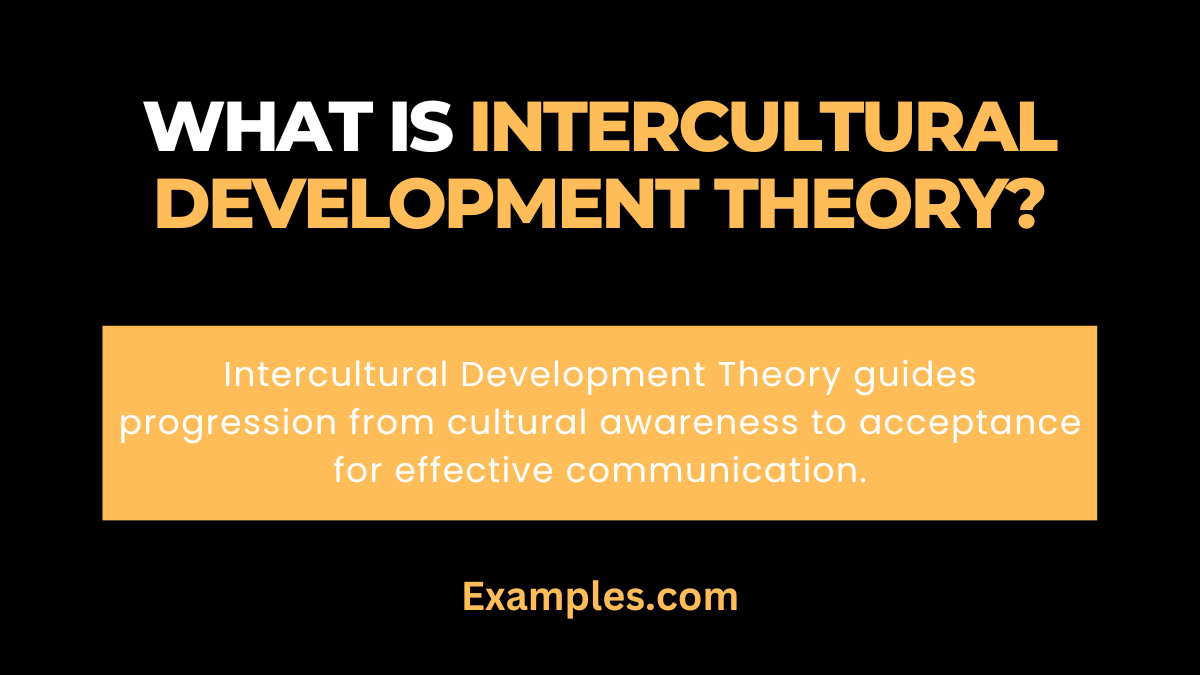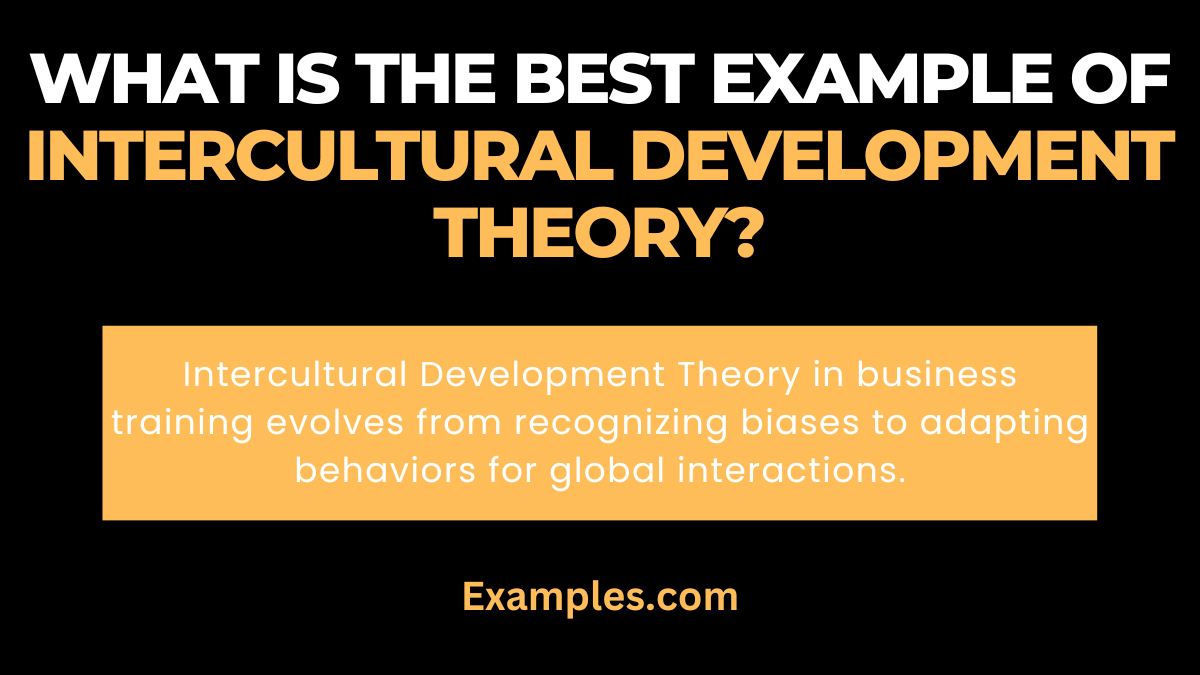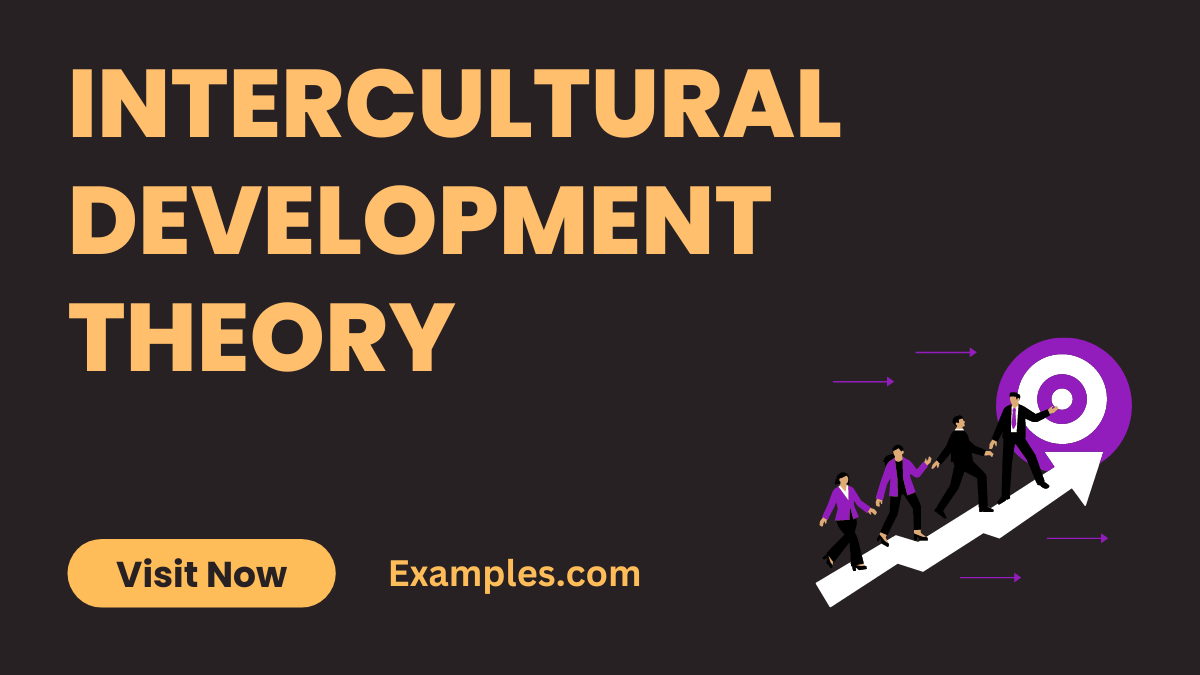19+ Intercultural Development Theory Examples
Intercultural Development Theory is a vital concept in Intercultural Communication, offering a framework for understanding and enhancing one’s ability to engage effectively across diverse cultural contexts. This theory outlines the stages of intercultural sensitivity and competence, guiding individuals and organizations in their journey towards more effective and empathetic interactions with different cultures. Embracing this theory not only improves communication skills but also fosters a deeper appreciation and understanding of cultural diversity.
What is Intercultural Development Theory?

Intercultural Development Theory is a framework that describes the process of becoming more competent in understanding and interacting with different cultures. It outlines various stages of awareness, understanding, and acceptance of cultural differences, helping individuals to navigate and adapt to diverse cultural settings effectively. This theory is instrumental in developing the skills and attitudes necessary for successful Intercultural Communication.
What is the Best Example of Intercultural Development Theory?

A practical example of Intercultural Development Theory is seen in international business training programs. These programs often incorporate stages of cultural sensitivity training, beginning with awareness of one’s own cultural biases, progressing to understanding and appreciating different cultural perspectives, and finally, developing the ability to adapt communication and behavior in a culturally appropriate manner. This approach demonstrates how the theory is applied to foster effective and respectful international business relations.
20 Examples of Intercultural Development Theory
Intercultural Development Theory provides a roadmap for understanding and improving interactions across diverse cultures. This theory outlines stages of increasing cultural awareness and competence, offering practical applications in various scenarios. From business and education to healthcare and personal relationships, this theory assists individuals and organizations in navigating cultural complexities, thereby enhancing Intercultural Communication and fostering mutual respect and understanding in diverse settings.
- Initial Denial Stage: Ignorance or denial of cultural differences.
“I used to think everyone shared similar values, regardless of their cultural background.” - Defense Stage: Recognizing differences but viewing one’s own culture as superior.
“I used to believe my cultural practices were better than others.” - Minimization Stage: Acknowledging superficial cultural differences but believing in universal human similarities.
“I realized that while we share common human values, our cultural expressions are different.” - Acceptance Stage: Recognizing and appreciating deep cultural differences.
“I now appreciate that different cultural practices offer unique perspectives and values.” - Adaptation Stage: Adapting behavior to effectively communicate across cultures.
“I learned to modify my communication style to better interact with my international colleagues.” - Integration Stage: Integrating multiple cultural views and navigating between them fluidly.
“I can now navigate between my culture and others, blending different perspectives seamlessly.” - Cultural Sensitivity in Education: Educators adapting teaching methods for culturally diverse classrooms.
“As a teacher, I incorporate diverse cultural examples to resonate with all students.” - International Business Negotiations: Adapting negotiation strategies to fit different cultural contexts.
“In negotiations, I consider each party’s cultural background to find mutually beneficial solutions.” - Multicultural Team Management: Leading teams with members from various cultural backgrounds.
“I use different leadership approaches depending on the cultural makeup of my team.” - Healthcare Provider Training: Healthcare professionals being trained to understand cultural sensitivities in patient care.
“As a nurse, I learned to respect and accommodate my patients’ diverse cultural health beliefs.” - Cross-Cultural Customer Service: Customer service representatives tailoring their approach to diverse customers.
“I adjust my communication style to meet the cultural expectations of each customer.” - Cultural Competence in Counseling: Therapists understanding clients’ cultural backgrounds to provide effective counseling.
“In therapy sessions, I consider my client’s cultural background to better understand their perspective.” - Expatriate Cultural Training: Preparing employees for cultural differences before working abroad.
“Before my assignment overseas, I received training on local customs and etiquette.” - Tourism Industry Sensitivity: Tourism professionals understanding cultural norms of their international guests.
“Working in tourism, I ensure that we respect the cultural preferences of all our guests.” - Global Marketing Strategies: Marketers creating campaigns that resonate with different cultural groups.
“Our global marketing campaigns are tailored to reflect cultural nuances in each region.” - Intercultural Conflict Resolution: Resolving misunderstandings by understanding cultural differences.
“In conflicts, I consider cultural backgrounds to find a respectful resolution.” - Cultural Exchange Programs: Students experiencing and learning from other cultures.
“Participating in a cultural exchange program, I developed a deeper understanding of other ways of life.” - Diplomatic Communication Skills: Diplomats effectively engaging with diverse cultural representatives.
“As a diplomat, I navigate different cultural protocols to build international relationships.” - Intercultural Design Thinking: Designers incorporating diverse cultural elements into their work.
“In my designs, I integrate elements that reflect various cultural aesthetics.” - Language Learning and Cultural Immersion: Learning a new language to better understand the associated culture.
“Learning Spanish not only improved my language skills but also my understanding of Spanish culture.”
These examples highlight the practical application of Intercultural Development Theory in enhancing Intercultural Communication across various fields, demonstrating its significance in promoting cultural competence and empathy.
Intercultural Development Theory in Education
Integrating Intercultural Development Theory into education is vital for cultivating a culturally competent and inclusive learning environment. This theory enhances the educational experience by promoting understanding and appreciation of diverse cultural backgrounds among students and educators.
- Culturally Responsive Teaching: Incorporates students’ cultural references in all aspects of learning.
- Curriculum Diversity: Ensures the curriculum reflects a variety of cultural perspectives.
- Student Awareness and Sensitivity: Encourages students to recognize and respect cultural differences.
- Teacher Training: Equips educators with skills to handle a culturally diverse classroom effectively.
- Inclusive Classroom Environment: Fosters a learning space where all cultures are valued and respected.
- Cultural Exchange Programs: Facilitates programs that offer students firsthand experience of different cultures.
- Language Inclusivity: Supports multilingualism and respect for linguistic diversity.
- Global Competence Education: Prepares students to thrive in a global, interconnected world.
Incorporating Intercultural Development Theory in education broadens students’ horizons, preparing them for global citizenship and fostering a deeper understanding of the world’s cultural diversity.
Intercultural Development Theory in Social Work
Applying Intercultural Development Theory in social work is crucial for providing culturally sensitive and effective services. This approach helps social workers better understand and meet the diverse needs of their clients.
- Cultural Competence in Client Assessment: Enables social workers to assess clients’ needs within their cultural context.
- Understanding of Cultural Dynamics: Helps in comprehending the cultural dynamics affecting clients’ lives.
- Tailored Intervention Strategies: Facilitates the development of culturally appropriate intervention strategies.
- Building Trust with Clients: Enhances the ability to build trust with clients from various cultural backgrounds.
- Awareness of Cultural Biases: Encourages social workers to be aware of their own cultural biases and prejudices.
- Cross-Cultural Communication Skills: Improves communication with clients from diverse cultures.
- Community Engagement and Advocacy: Supports effective engagement and advocacy within diverse communities.
- Continual Learning and Adaptation: Promotes ongoing learning about different cultures and adaptation of social work practices.
Intercultural Development Theory plays a vital role in social work by equipping professionals with the understanding and skills needed to serve diverse communities effectively and empathetically.
Intercultural Development Theory serves as a pivotal guide for enhancing communication and understanding in diverse cultural contexts. This article has explored its application in education and social work, highlighting its significance in fostering cultural competence. Embracing this theory is essential for effectively navigating the complexities of intercultural interactions, leading to more inclusive, empathetic, and effective communication across various cultural landscapes.



